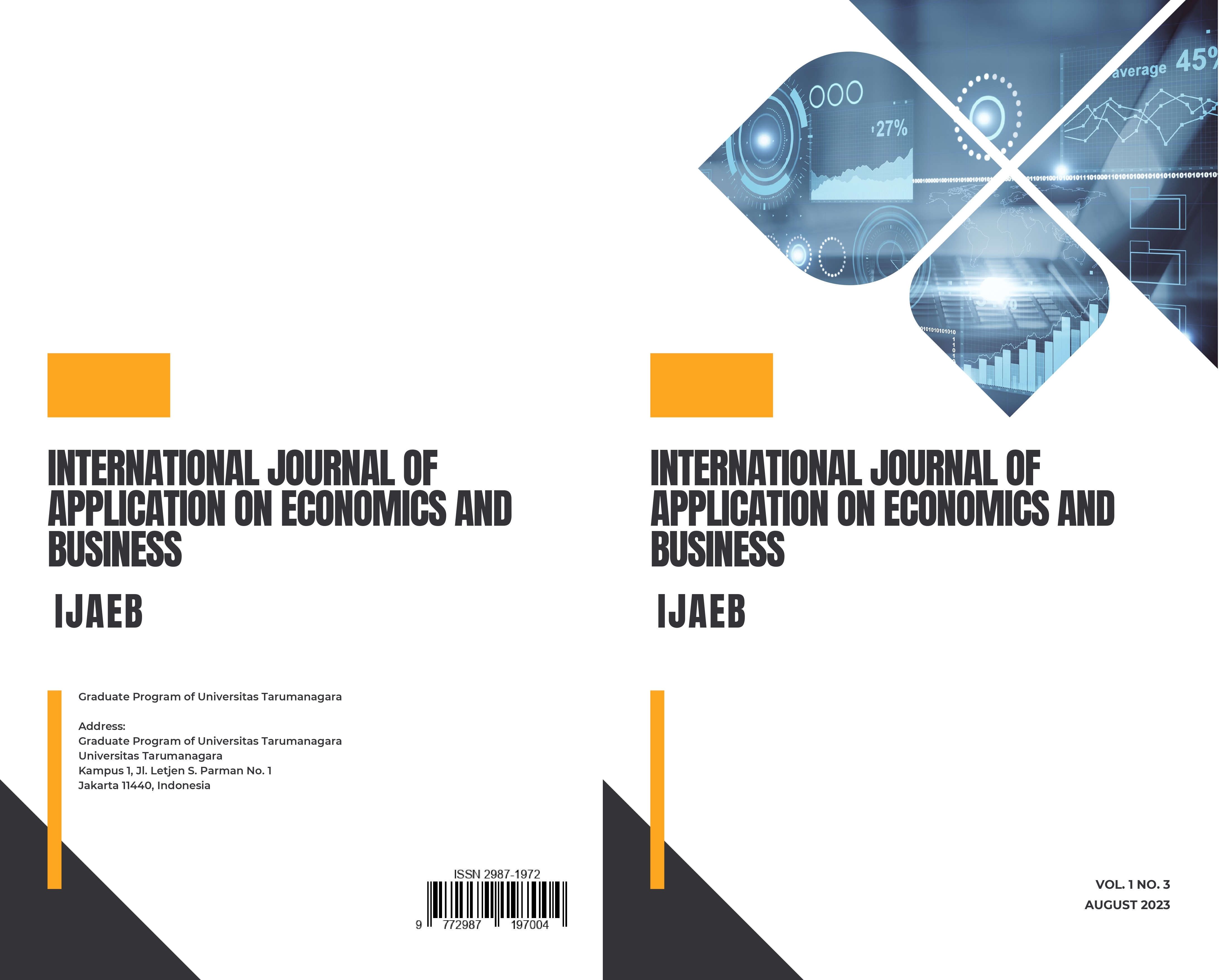FACTORS AFFECTING ACCOUNTING CONSERVATISM IN CONSUMER GOODS COMPANIES IN INDONESIA STOCK EXCHANGE
Main Article Content
Abstract
This study examines the relationship between accounting conservatism and leverage, capital intensity, profitability, dividend policy, and firm size in consumer goods non-cyclical companies listed on the Indonesia Stock Exchange between 2017 and 2019. In this research 87 observational data are used in which obtained from 29 consumer goods non-cyclical companies that have met established criteria, where the samples are selected using purposive sampling technique. Hypothesis testing in this study uses multiple regression analysis. The data were calculated and processed using Microsoft Excel 2013 dan EViews 12. This research tested the classical assumption before testing the hypothesis and used the multiple linear regression model method, which the suitable model for this research is Fixed Effect Model (FEM). The findings of this study show that accounting conservatism is significantly influenced by the variables of leverage and profitability, but not by the factors of capital intensity, dividend policy, or business size.
Article Details
Section

This work is licensed under a Creative Commons Attribution-NonCommercial-ShareAlike 4.0 International License.
This journal provides immediate open access to its content on the principle that making research freely available to the public supports a greater global exchange of knowledge.
IJAEB by Graduate Program of Universitas Tarumanagara is licensed under a Creative Commons Attribution-NonCommercial-ShareAlike 4.0 International License.. Permissions beyond the scope of this license may be available at https://journal.untar.ac.id/index.php/ijaeb
References
Risdiyani & Kusmuriyanto (2015). Analisis Faktor-Faktor Yang Mempengaruhi Penerapan Konservatisme Akuntansi. Accounting Analysis Journal, 4(3), 2015
Alfian, A & Sabeni, A. (2013). Analisis Faktor-Faktor yang Berpengaruh Terhadap Pemilihan Konservatisme Akuntansi. Diponegoro Journal of Accounting, 2(3), 2337-3806
Mora & Walker (2015). The Implications Of Research On Accounting Conservatism For Accounting Standard Setting, Accounting And Business Research, 45:5, 620-650, doi : https://doi.org/10.1080/00014788.2015.1048770
Purnama, W. & Daljono (2013). Pengaruh Ukuran Perusahaan, Rasio Leverage, Intensitas Modal, dan Likuiditas Perusahaan terhadap Konservatisme Perusahaan yang Belum Menggunakan IFRS. Diponegoro Journal of Accounting, 2(3), 2337-3806
Jensen, M. C., & Meckling, W. H. (1976). Theory of the firm: Managerial behavior, agency costs and ownership structure. Journal of financial economics, 3(4), 305-360.
Wiguna, R. N. & Hastuti, R. T. (2020). Pengaruh Kepemilikan Manajerial, Tingkat Hutang, dan Growth Opportunities terhadap Konservatisme Akuntansi. Jurnal Multiparadigma Akuntansi Tarumanagara 2, 1130-1137.
Lukman & Tanuwijaya (2020) The Effect of Financial Performance and Intellectual Capital on Firm Value with CSR as a Mediating Variable in Banking Industry. International Conference on Entrepreneurship and Business Management, 9(1), 174
Watts, R. L. & Zimmerman, J. L. (1990). Positive Accounting Theory: A Ten Year Perspective. The Accounting Review, 65(1), 131-156
Solichah, N. & Fachrurrozie, F. (2019). Effect of Managerial Ownership, Leverage, Firm Size and Profitability on Accounting Conservatism. Accounting Analysis Journal, 8(3), 151-157
Affianti, D. & Supriyati, S. (2017). The Effect of Good Corporate Governance, Firm Size, Leverage and Profitability on Accounting Conservatism Level in Banking Industry. The Indonesian Accounting Review, 7(2), 191-202.
Financial Accounting Standard Board (1980). Statement of Financial Accounting Concepts No. 2 Qualitative Characteristics of Accounting Information.
Daryatno, A. B. & Santioso, L. (2020). Faktor-Faktor yang Mempengaruhi Penerapan Konservatisme Akuntansi pada Perusahaan Manufaktur yang Terdaftar di BEI. Jurnal Muara Ilmu Ekonomi dan Bisnis, 4(1), 126-136
Rivandi, M. & Ariska, S. (2019). Pengaruh Intensitas Modal, Dividend Payout Ratio, dan Financial Distress terhadap Konservatisme Akuntansi. Jurnal Benefita, 4(1), 104-114.
Noviantari, N. W. & Ratnadi, N. M. D. (2015). Pengaruh Financial Distress Ukuran Perusahaan, dan Leverage pada Konservatisme Akuntansi. E-Jurnal Akuntansi Universitas Udayana, 11(3), 646-660
Sekaran, U. & Bougie, R. (2016). Research Methods for Business: A Skill-Building Approach 7th Edition. Chichester: John Wiley & Sons.
Pangestika, S. (2015). Analisis Estimasi Model Regresi Data Panel dengan Pendekatan Common Effect Model (CEM), Fixed Effect Model (FEM), dan Random Effect Model (REM). Skripsi. Universitas Negeri Semarang, Semarang.
Ghozali, I. & Ratmono, D. (2017). Analisis Multivariat dan Ekonomterika: Teori, Konsep, dan Aplikasi dengan EViews 10 Edisi 2. Semarang: Badan Penerbit Universitas Diponegoro. [18] Nurhayati, M. (2013). Profitabilitas, Likuiditas, dan Ukuran Perusahaan terhadap Kebijakan Dividen dan Nilai Perusahaan Sektor Non Jasa. Jurnal Keuangan dan Bisnis, No.2, Vol. 5, Hal 143-152.
Hajawiyah, A., Wahyudin, A., Kiswanto, K., Sakinah, S., & Pahala, I. (2020). The Effect of Good Corporate Governance Mechanisms on Accounting Conservatism with Leverage as A Moderating Variable. Cogent Business & Management, 7(1), 1-12.
Hotimah, H. H. H. (2020). Pengaruh Kepemilikan Manajerial, Ukuran Perusahaan, Rasio Leverage, Intensitas Modal terhadap Konservatisme Akuntansi. Jurnal Ilmu dan Riset Akuntansi, 2460-0585
Salim, J. & Apriwenni, P. (2018). Analisis Pengaruh Intensitas Modal, Likuiditas, dan Leverage terhadap Konservatisme Akuntansi. Skripsi. Institut Bisnis dan Informatika Kwik Kian Gie, Jakarta.
Louw, F. (2020). Faktor-Faktor yang Memengaruhi Konservatisme Akuntansi (Studi Kasus Perusahaan Manufaktur di Bursa Efek Indonesia). Skripsi. Fakultas Ekonomi dan Bisnis Universitas Widya Dharma, Pontianak.
Padmawati, I. R. & Fachrurrozie (2015). Pengaruh Mekanisme Good Corporate Governance dan Kualitas Audit Terhadap Tingkat Konservatisme Akuntansi. Accounting Analysis Journal, 4(1), 2252-5765
Abdurrahman, M. A. & Ermawati, W. J. (2018). The Effect of Leverage, Financial Distress and Profitability on Accounting Conservatism in Mining Companies in Indonesia. Jurnal Manajemen dan Organisasi (JMO), 9(3), 164-173.
Yuliarti, D. & Yanto, H. (2017). The Effect of Leverage, Firm Size, Managerial Ownership, Size of Board Commissioners and Profitability to Accounting Conservatism. Accounting Analysis Journal, 6(2), 173-184.
Sholikhah, R. M. & Suryani, A. W. (2020). The Influence of Financial Distress, Conflict of Interest, and Litigation Risk on Accounting Conservatism. International Research Conference on Economivc and Business, 222-239
Aristiyani, D. G. U. & Wirawati, I. G. P (2013). Pengaruh Debt to Total Assets, Dividend Payout Ratio, dan Ukuran Perusahaan pada Konservatisme Akuntansi Perusahaan Manufaktur di BEI. E-Jurnal Akuntansi Universitas Udayana, 3(3), 216-230
Sumiari, K. N. & Wirama, D. G. (2016). Pengaruh Ukuran Perusahaan Terhadap Konservatisme Akuntansi dengan Leverage sebagai Variabel Pemoderasi. E-Jurnal Ekonomi dan Bisnis Universitas Udayana, 5(4),

